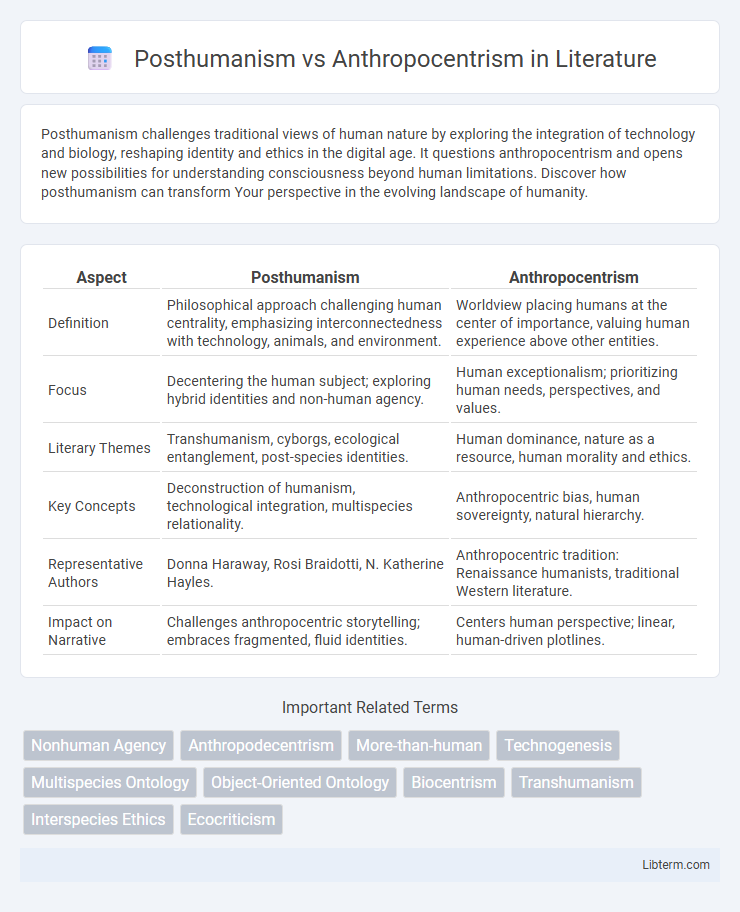Posthumanism challenges traditional views of human nature by exploring the integration of technology and biology, reshaping identity and ethics in the digital age. It questions anthropocentrism and opens new possibilities for understanding consciousness beyond human limitations. Discover how posthumanism can transform Your perspective in the evolving landscape of humanity.
Table of Comparison
| Aspect | Posthumanism | Anthropocentrism |
|---|---|---|
| Definition | Philosophical approach challenging human centrality, emphasizing interconnectedness with technology, animals, and environment. | Worldview placing humans at the center of importance, valuing human experience above other entities. |
| Focus | Decentering the human subject; exploring hybrid identities and non-human agency. | Human exceptionalism; prioritizing human needs, perspectives, and values. |
| Literary Themes | Transhumanism, cyborgs, ecological entanglement, post-species identities. | Human dominance, nature as a resource, human morality and ethics. |
| Key Concepts | Deconstruction of humanism, technological integration, multispecies relationality. | Anthropocentric bias, human sovereignty, natural hierarchy. |
| Representative Authors | Donna Haraway, Rosi Braidotti, N. Katherine Hayles. | Anthropocentric tradition: Renaissance humanists, traditional Western literature. |
| Impact on Narrative | Challenges anthropocentric storytelling; embraces fragmented, fluid identities. | Centers human perspective; linear, human-driven plotlines. |
Introduction to Posthumanism and Anthropocentrism
Posthumanism challenges traditional anthropocentrism by decentering humans as the primary measure of value and existence, emphasizing the interconnectedness of all life forms and technologies. Anthropocentrism prioritizes human beings above other entities, often leading to environmental exploitation and ethical limitations in considering non-human perspectives. Understanding these contrasting frameworks is essential for addressing contemporary ethical, ecological, and technological issues in a more inclusive and holistic manner.
Historical Roots of Anthropocentrism
Anthropocentrism traces its historical roots to classical Western philosophy, particularly the works of Aristotle, who emphasized human rationality as the defining characteristic separating humans from other beings. This worldview has been reinforced by Judeo-Christian traditions that position humans at the center of creation and grant them dominion over nature. The legacy of anthropocentrism underpins modern environmental and ethical debates, challenging posthumanism's call to decenter humans and recognize the agency and intrinsic value of non-human entities.
Defining Posthumanism: Beyond the Human Subject
Posthumanism challenges Anthropocentrism by decentering the human subject and emphasizing interconnectedness with technology, non-human animals, and ecological systems. It redefines identity and agency beyond traditional humanist boundaries, promoting a fluid understanding of existence that transcends biological and cognitive limitations. This perspective fosters ethical considerations that include diverse entities, advocating for a more inclusive view of humanity's role in the world.
Key Philosophers and Theoretical Foundations
Key philosophers in posthumanism include Donna Haraway, whose "Cyborg Manifesto" challenges traditional human-centered paradigms, and Rosi Braidotti, who emphasizes the fluidity and interconnectedness of identity beyond human exceptionalism. Anthropocentrism is rooted in classical thinkers like Aristotle and was further developed in Enlightenment philosophy by Immanuel Kant, who positioned humans as the central moral agents. Theoretical foundations of posthumanism critique anthropocentrism by decentering the human subject, promoting a multispecies ethics and embracing technology's role in reshaping human identity and agency.
Human Exceptionalism: Critiques and Challenges
Human exceptionalism, a core tenet of anthropocentrism, positions humans as fundamentally superior to other species, often justifying dominance over nature. Posthumanism challenges this notion by critiquing human-centered ideologies, emphasizing interconnectedness and decentering humans in ethical and epistemological frameworks. These critiques expose the limitations of exceptionalism in addressing ecological crises and call for a more inclusive understanding of agency beyond human supremacy.
Technology, AI, and the Posthuman Future
Posthumanism challenges anthropocentrism by prioritizing technology and AI as central to evolving human identity and capabilities beyond traditional biological limits. Advances in artificial intelligence and cybernetic enhancements create new paradigms where human-machine integration redefines agency, intelligence, and ethical frameworks. This posthuman future emphasizes symbiosis with technology, redefining what it means to be human in a digitally interconnected world.
Environmental Ethics: Posthumanism versus Anthropocentrism
Posthumanism challenges anthropocentrism by decentering humans from the ethical sphere, emphasizing the intrinsic value of non-human life forms and ecosystems. Environmental ethics rooted in posthumanism advocate for a more inclusive moral consideration that extends agency and rights to animals, plants, and technologies, promoting biodiversity and ecological sustainability. In contrast, anthropocentric frameworks prioritize human interests and needs, often leading to environmental degradation and species extinction due to human-centered exploitation of natural resources.
Implications for Social and Cultural Norms
Posthumanism challenges anthropocentrism by decentering human exceptionalism and promoting the integration of technology, non-human entities, and ecological systems into social identity, transforming cultural norms around agency and ethics. This paradigm shift encourages rethinking concepts of personhood, community, and rights, fostering inclusivity that extends beyond humans to encompass artificial intelligence, animals, and the environment. Consequently, posthumanist perspectives influence policy-making, artistic expressions, and educational frameworks, reshaping societal values towards interconnectivity and sustainability.
Posthumanism in Literature and Popular Culture
Posthumanism in literature and popular culture explores the decentering of the human subject by emphasizing the integration of technology, artificial intelligence, and non-human entities, challenging traditional anthropocentric narratives. Works such as Neal Stephenson's *Snow Crash* and films like *Ex Machina* illustrate the blurred boundaries between human and machine, reflecting a shift toward hybrid identities and more fluid conceptions of consciousness. This thematic focus critiques human exceptionalism and raises questions about ethics, identity, and the future of human evolution in a technologically saturated world.
Rethinking Ethics and Agency in a Posthuman World
Rethinking ethics in a posthuman world challenges anthropocentrism by decentering human agency and recognizing the interconnectedness of all entities, including non-human animals, artificial intelligences, and ecological systems. Posthumanist ethics emphasize relationality, distributed agency, and the dissolution of rigid subject-object boundaries, advocating for frameworks that account for multispecies justice and technological co-evolution. This paradigm shift reconfigures moral responsibility beyond human exceptionalism, promoting inclusive decision-making that honors diverse forms of life and intelligence.
Posthumanism Infographic

 libterm.com
libterm.com